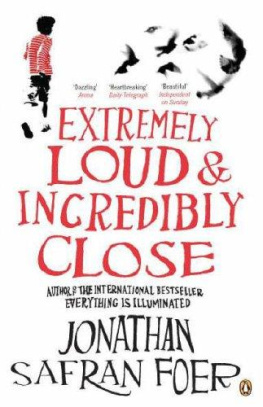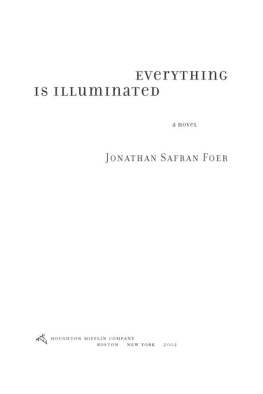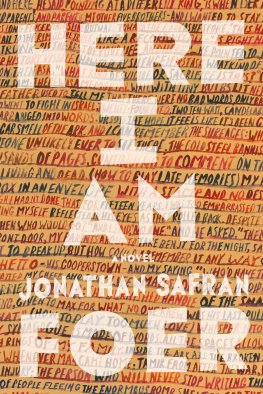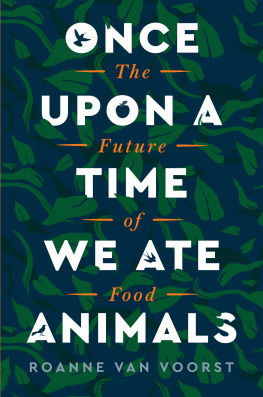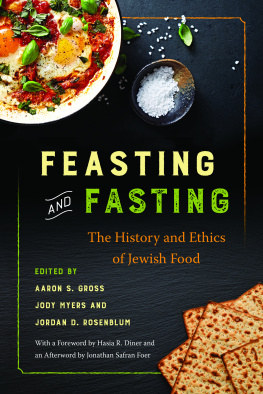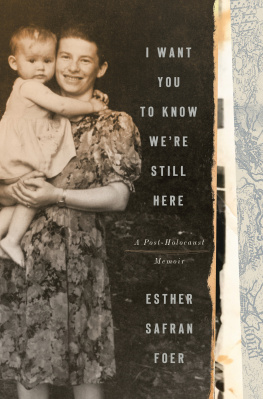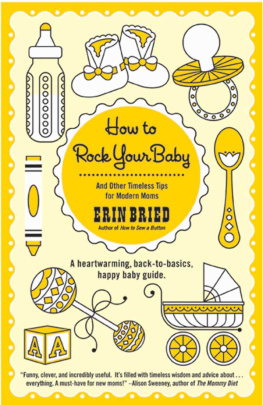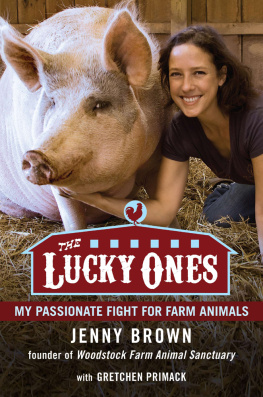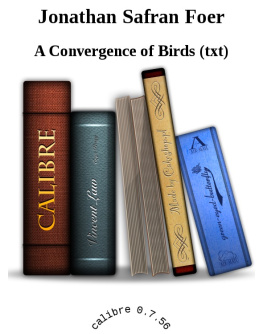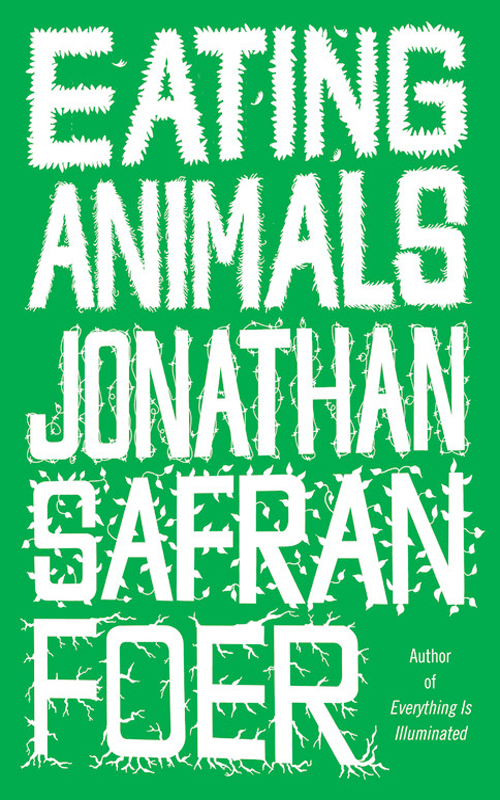Extremely Loud and Incredibly Close
Everything Is Illuminated
Copyright 2009 by Jonathan Safran Foer
All rights reserved. Except as permitted under the U.S. Copyright Act of 1976, no part of this publication may be reproduced, distributed, or transmitted in any form or by any means, or stored in a database or retrieval system, without the prior written permission of the publisher.
Little, Brown and Company
Hachette Book Group
237 Park Avenue
New York, NY 10017
Visit our website at www.HachetteBookGroup.com.
www.twitter.com/littlebrown.
First eBook Edition: November 2009
Little, Brown and Company is a division of Hachette Book Group, Inc. The Little, Brown name and logo are trademarks of Hachette Book Group, Inc.
ISBN: 978-0-316-08664-6
for Sam and Eleanor,
trusty compasses
Americans choose to eat less than .25% of the known edible food on the planet.
The Fruits of Family Trees
WHEN I WAS YOUNG, I would often spend the weekend at my grandmothers house. On the way in, Friday night, she would lift me from the ground in one of her fire-smothering hugs. And on the way out, Sunday afternoon, I was again taken into the air. It wasnt until years later that I realized she was weighing me.
My grandmother survived the War barefoot, scavenging other peoples inedibles: rotting potatoes, discarded scraps of meat, skins, and the bits that clung to bones and pits. And so she never cared if I colored outside the lines, as long as I cut coupons along the dashes. And hotel buffets: while the rest of us erected Golden Calves of breakfast, she would make sandwich upon sandwich to swaddle in napkins and stash in her bag for lunch. It was my grandmother who taught me that one tea bag makes as many cups of tea as youre serving, and that every part of the apple is edible.
Money wasnt the point. (Many of those coupons I clipped were for foods she would never buy.)
Health wasnt the point. (She would beg me to drink Coke.)
My grandmother never set a place for herself at family dinners. Even when there was nothing more to be done no soup bowls to be topped off, no pots to be stirred or ovens checked she stayed in the kitchen, like a vigilant guard (or prisoner) in a tower. As far as I could tell, the sustenance she got from the food she made didnt require her to eat it.
In the forests of Europe, she ate to stay alive until the next opportunity to eat to stay alive. In America, fifty years later, we ate what pleased us. Our cupboards were filled with food bought on whims, overpriced foodie food, food we didnt need. And when the expiration date passed, we threw it away without smelling it. Eating was carefree. My grandmother made that life possible for us. But she was, herself, unable to shake the desperation.
Growing up, my brothers and I thought our grandmother was the greatest chef who ever lived. We would literally recite those words when the food came to the table, and again after the first bite, and once more at the end of the meal: You are the greatest chef who ever lived. And yet we were worldly enough kids to know that the Greatest Chef Who Ever Lived would probably have more than one recipe (chicken with carrots), and that most Great Recipes involved more than two ingredients.
And why didnt we question her when she told us that dark food is inherently healthier than light food, or that most of the nutrients are found in the peel or crust? (The sandwiches of those weekend stays were made with the saved ends of pumpernickel loaves.) She taught us that animals that are bigger than you are very good for you, animals that are smaller than you are good for you, fish (which arent animals) are fine for you, then tuna (which arent fish), then vegetables, fruits, cakes, cookies, and sodas. No foods are bad for you. Fats are healthy all fats, always, in any quantity. Sugars are very healthy. The fatter a child is, the healthier it is especially if its a boy. Lunch is not one meal, but three, to be eaten at 11:00, 12:30, and 3:00. You are always starving.
In fact, her chicken and carrots probably was the most delicious thing Ive ever eaten. But that had little to do with how it was prepared, or even how it tasted. Her food was delicious because we believed it was delicious. We believed in our grandmothers cooking more fervently than we believed in God. Her culinary prowess was one of our familys primal stories, like the cunning of the grandfather I never met, or the single fight of my parents marriage. We clung to those stories and depended on them to define us. We were the family that chose its battles wisely, and used wit to get out of binds, and loved the food of our matriarch.
Once upon a time there was a person whose life was so good there was no story to tell about it. More stories could be told about my grandmother than about anyone else Ive ever met her otherwordly childhood, the hairline margin of her survival, the totality of her loss, her immigration and further loss, the triumph and tragedy of her assimilation and though I will one day try to tell them to my children, we almost never told them to one another. Nor did we call her by any of the obvious and earned titles. We called her the Greatest Chef.
Perhaps her other stories were too difficult to tell. Or perhaps she chose her story for herself, wanting to be identified by her providing rather than her surviving. Or perhaps her surviving is contained within her providing: the story of her relationship to food holds all of the other stories that could be told about her. Food, for her, is not food. It is terror, dignity, gratitude, vengeance, joyfulness, humiliation, religion, history, and, of course, love. As if the fruits she always offered us were picked from the destroyed branches of our family tree.
Possible Again
UNEXPECTED IMPULSES STRUCK WHEN I found out I was going to be a father. I began tidying up the house, replacing long-dead lightbulbs, wiping windows, and filing papers. I had my glasses adjusted, bought a dozen pairs of white socks, installed a roof rack on top of the car and a dog/cargo divider in the back, had my first physical in half a decade... and decided to write a book about eating animals.
Fatherhood was the immediate impetus for the journey that would become this book, but Id been packing my bags for most of my life. When I was two, the heroes of all of my bedtime stories were animals. When I was four, we fostered a cousins dog for a summer. I kicked it. My father told me we dont kick animals. When I was seven, I mourned the death of my goldfish. I learned that my father had flushed him down the toilet. I told my father in other, less civil words we dont flush animals down the toilet. When I was nine, I had a babysitter who didnt want to hurt anything. She put it just like that when I asked her why she wasnt having chicken with my older brother and me: I dont want to hurt anything.
Hurt anything? I asked.
You know that chicken is chicken, right?
Frank shot me a look: Mom and Dad entrusted this stupid woman with their precious babies?
Her intention might or might not have been to convert us to vegetarianism just because conversations about meat tend to make people feel cornered, not all vegetarians are proselytizers but being a teenager, she lacked whatever restraint it is that so often prevents a full telling of this particular story. Without drama or rhetoric, she shared what she knew.
My brother and I looked at each other, our mouths full of hurt chickens, and had simultaneous


